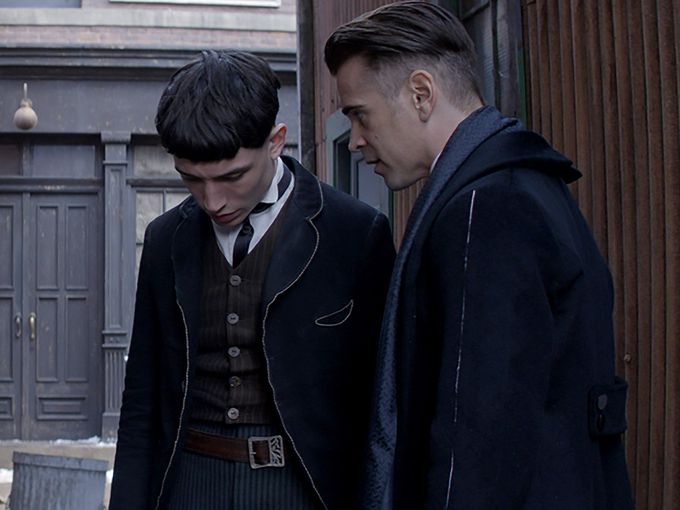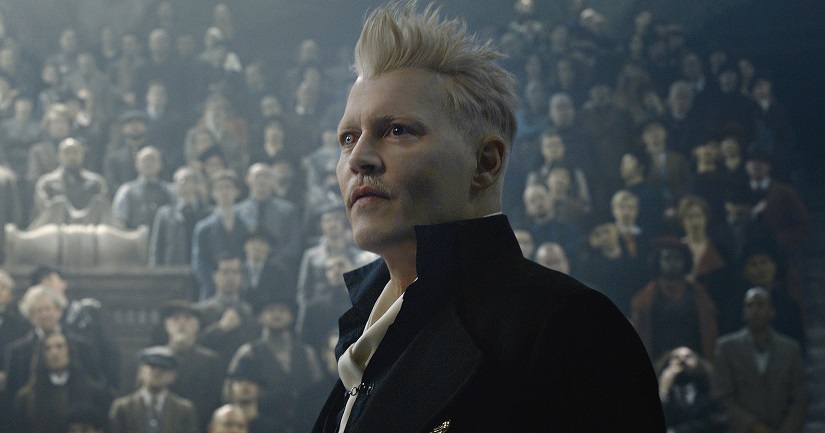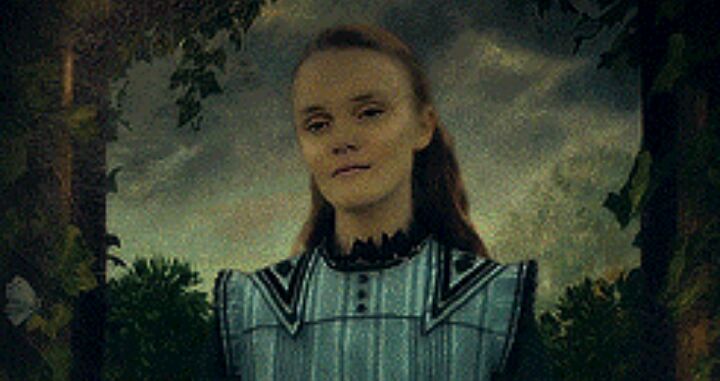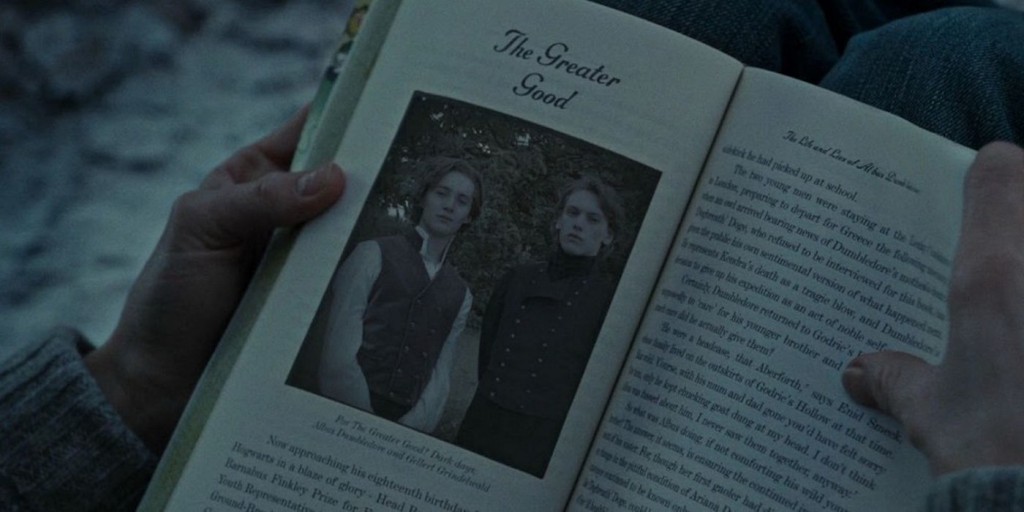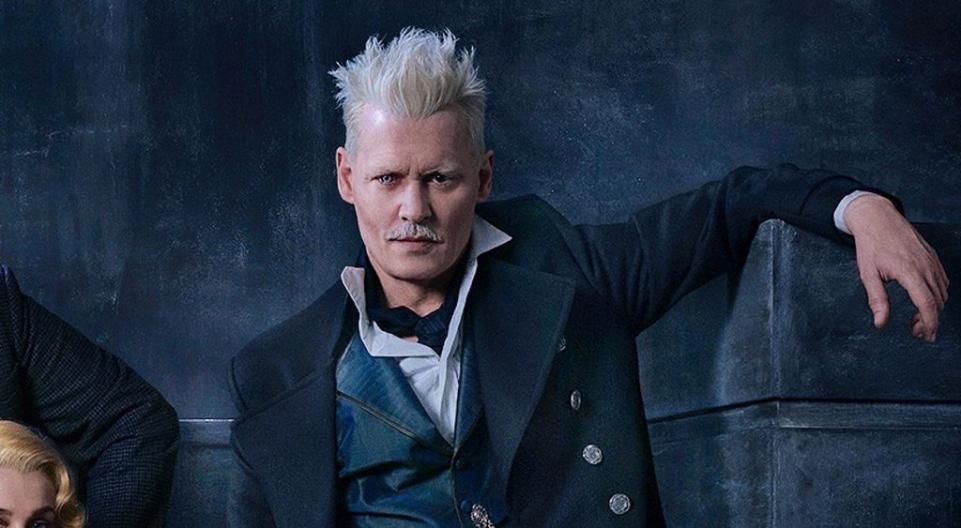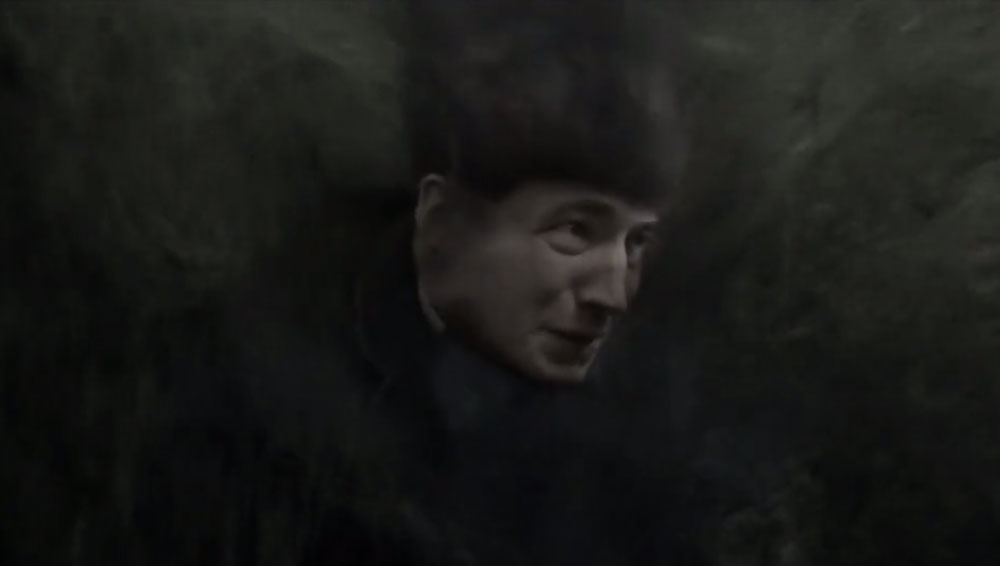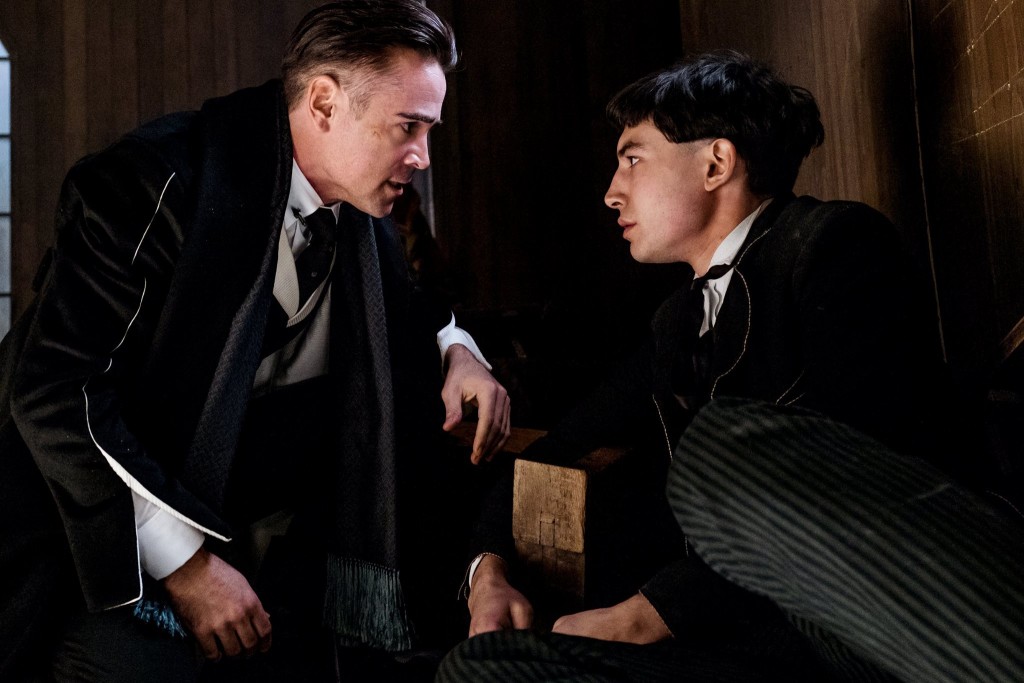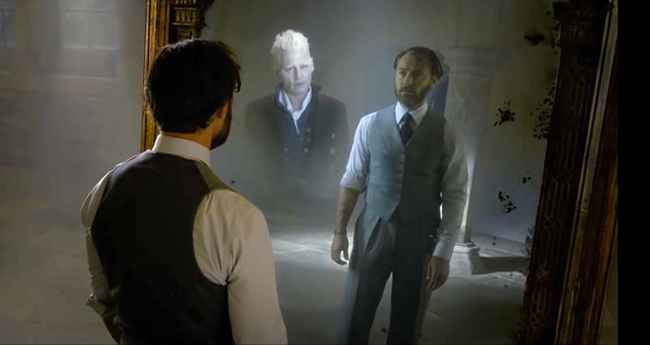The Identity of Aurelius Dumbledore: Grindelwald’s Greatest Lie or Game-Changing Truth?

Dec 02, 2018
Fandom, Fans, Fantastic Beasts, Films, J.K. Rowling, Movies, News, Opinion
In the lead-up to the release of Fantastic Beasts: The Crimes of Grindelwald, trailers, images and interviews hinted that Credence Barebone would play a pivotal role in the film and that his true identity would be of great significance to the plot. All the teasers seemed to indicate this would play out in a big reveal that would confirm his relation to Leta Lestrange, a family with a dark and complicated history.
Rowling, however, confounded fans with a twist that no one expected, resurrecting another ancient wizarding family from the ashes and connecting them to the troubled orphan—all based on the word of the silver-tongued Gellert Grindelwald. After the shockwave subsided, a frenzied debate naturally ensued within the fandom, questioning the validity of Grindelwald’s claim and wondering if it could actually be true…
And therein lies the essential question to be answered. It is not whether Rowling’s plot twist is consistent with the larger story—though we firmly believe it will prove to be—it is whether Grindelwald is telling the truth when he utters the explosive claim regarding Credence Barebone’s parentage. For, in the closing minutes of the film, Grindelwald whispers to the trembling, angry young man that his given name is Aurelius Dumbledore, brother to none other than the renowned Hogwarts professor Albus. Do we take the known manipulator at his word—or not? There are plausible theories in either case.
Possible theories if Grindelwald is lying…
Grindelwald’s claim could be entirely false.
He has an established history of manipulating both friends and followers with lies. Only one film prior, he lied to Credence repeatedly. Grindelwald feigned interest in the boy, pretending to care about his well-being and his fate, and, though he believed him to be a squib, issued the promise that he would gladly welcome Credence into the wizarding community with open arms.
Every part of Grindelwald’s extended plan in wooing Credence through Crimes of Grindelwald is that of a well-orchestrated chess match. He leads Credence to the half-elf who supposedly accompanied him on his trans-Atlantic voyage, though, in actuality, she accompanied Leta and her brother, Corvus. After the servant is abruptly killed on Grindelwald’s orders, he leaves Credence desperate for answers. This drives Credence into a hesitant alliance, just as Grindelwald desires.
Even conjuring up the phoenix to confirm Credence’s identity as a Dumbledore may not be all it seems. Grindelwald, as evidenced in the opening escape, is a master of transfiguration, and he could easily transfigure the bird into the phoenix Credence needed to see. Credence does not have to be Albus’ brother; he simply needs to believe that he is so that he’ll have a reason to exact revenge upon the man Grindelwald cannot touch himself. Credence may simply be what he first appeared to be, a remarkable obscurus with an unremarkable past in desperate need of attention, direction and guidance—and a mentor now all too willing to supply it. Nothing is against the rules in the game Grindelwald plays–for the Greater Good, everything is justified.
Grindelwald’s claim could be a partial lie and, therefore, a half-truth.
Perhaps the small bird attracted to Credence is a phoenix, and it came to him because he is linked by blood to the line of Dumbledore. What if the prophecy applies to him, not as a Lestrange, as assumed by the larger wizarding community, but as a Dumbledore? If the Dumbledore family sent him away, he is still the “son cruelly banished” and rescued from the sea. The daughter who despairs could be Ariana, and the avenger could be Credence himself, as prompted by Grindelwald.
But many fans and fan-sites have raised questions about how this could fit within the established timeline. Their father, Percival, was imprisoned in Azkaban after he attacked the muggles who assaulted Ariana when she was six, presumably in 1891. This is about 10 years or so before Credence’s birth, as far as we can judge.
That being the case, what if Grindelwald is only lying about Credence being Albus’ brother? What if he issued the half-truth in order to fuel a burgeoning obsession with Albus that will make Credence susceptible to manipulation? As a brother, Credence will feel himself an equal. He will feel that his dismissal is more than a slight, but an outright betrayal. He will feel emboldened to prove himself and his worth. And he will concentrate all that anger on the one who gets all the attention—and who stands in their way.
Claiming that Credence is Albus’ brother would be far more useful to Grindelwald than, say, claiming he is Dumbledore’s nephew, the son of his sister, Ariana. But is this the truth omitted? And, if so, how could it be possible?
There are two predominant explanations in play.
Ariana became pregnant by one of the muggles who assaulted her.
Some are speculating that Ariana became pregnant as a result of the vicious assault she suffered by the muggle boys in her village. As already mentioned, she was known to be six at the time, and the attack coincided with Percival’s imprisonment, a widely-known event. It would seem impossible, then, but some argue that Rowling may alter the timeline in order to make this work. This seems, to us, to be the least likely of the theories.
Ariana became pregnant by Gellert Grindelwald.
Ariana could have become pregnant as teenager and given birth to the child before the fight between Aberforth, Grindelwald and Albus which led to her death. She was difficult to manage, required constant oversight and was disturbed and unpredictable. It is not inconceivable that she snuck out of her home at some point and was seduced by a local, as yet unnamed, wizard.
A more interesting variation of this theory is that Grindelwald himself is the father. When would he have had the opportunity? With an aunt in the village, he likely visited on other occasions, thus his visit to spend time with Dumbledore may not have been the first. The question is—what was his motivation? As calculating as Grindelwald is, it seems unlikely he would have been drawn into a casual seduction without a reason.
Is it possible that one of the muggle boys on whom Percival first exacted revenge bore some relation to Grindelwald and his family, if not by blood then by another loyalty? Might Grindelwald have carried a grudge against the Dumbledores and chosen his own revenge, one that would eventually cause the implosion of the family? He might have planned all this before he ever realized that he and Dumbledore shared common ground in both interests and abilities.
Or, he might have heard of Albus Dumbledore, a rising young star in the wizarding world, and elected to act on the adage: “Keep your friends close and your enemies closer.” By insinuating himself into the family through the weakest and most vulnerable member, he could have extracted all the information he needed to later endear himself to Dumbledore and gain his trust, whether he intended to manipulate and use Albus to enact his vision for the future or whether he meant to misdirect and thwart Albus as a potential rival.
That Ariana later bore his child, may have been an unforeseen result of their entanglement. Perhaps Kendra sent the child away, knowing that Ariana was not fit to raise him and hoping to avoid scandal. She could have doctored birth records to further protect the family, explaining small discrepancies over dates. But Ariana may not have willingly agreed to this plan and, later, in a fit of despair and regret, killed her mother in a heated argument during which she could not control her raging emotions.
Maybe it was her relationship with Grindelwald which sparked the fight between the siblings. When Albus returned home to discuss Ariana’s care with Aberforth, the argument might have turned contentious when Grindelwald held up to Albus all of their plans and downplayed his responsibility to his family. It would have been an explosive revelation, then, if Ariana burst onto the scene and declared her love for the dark wizard. Whether she mentioned the child at that time or not, it would have undoubtedly been an inciting event, causing an irreparable rift in the family and destroying Dumbledore’s faith in Grindelwald.
Possible theories if Grindelwald is telling the truth…
The child is Ariana’s but the family originally intended to raise him as a brother.
It is possible that Kendra initially intended to raise Ariana’s child as her brother, a common enough cover-up in such cases, deciding to bear any scandal over the question of paternity herself. In this scenario, Aberforth and Albus could have known about the child, and this could have factored into the fateful argument. Perhaps it was Albus who decided to send the child away, despite Ariana’s protests, because he could not commit to raise a baby and care for her as well. This would explain Grindelwald’s claim that the child is a brother and give ample reason for Credence to seek vengeance.
The child was born to Kendra Dumbledore.
Credence could also be a brother if Kendra engaged in an affair. Rowling has indicated she is not afraid to take the plot into such territory, revealing the story behind Leta Lestrange’s birth, and it’s possible that the fight which resulted in Kendra’s death was over the parentage of the child or Ariana’s disappointment in her mother’s lack of faithfulness to her father, who gave up everything to defend her honor.
The child was fathered by Percival Dumbledore.
It’s not impossible that Percival Dumbledore escaped from Azkaban. After all, Sirius Black was able to escape, and the Dumbledores are a family of talented, formidable wizards. It’s very likely that Percival possessed the skills to pull off such a feat. The powers that be would not want such news widely circulated, perhaps hoping to catch him before it was necessary to make the matter public. If this occurred, Percival could have set off to start a new life, of which Credence was the result, or he could have secretly returned to Kendra. He might have been caught and returned to Azkaban before the story became known—or he might have succumbed to the Dementors’ kiss.
The fight between Ariana and Kendra could have occurred when Ariana later insisted that her mother be forthcoming about the child. Perhaps Ariana was incensed that her father returned and her mother chose not to reveal his whereabouts, or perhaps she was angered that Kendra sent the child away to avoid a scandal.
Ariana and Credence are one and the same.
Another theory, which renders Grindelwald’s claim true but which would require much more explanation from Rowling, is the suggestion that Ariana and Credence are one and the same, making him, in fact, Albus’ brother. How that might work remains to be seen, but for the writer who devised the Horcrux and the magical constraints of wand mastery, it’s certainly possible.
Perhaps it has to do with an unknown factor essential to the nature of obscurials, one which would not be widely understood since so few survive. The fandom has long believed that Ariana was an undiagnosed obscurus based on the descriptions of her behavior and magical outbursts, and there is likely much that remains unknown about their existence—and their demise. Perhaps the fight caused a split which sent her obscurial form into another host? Perhaps it caused her obscurial to, for some reason, adopt a new human form?
Many of the theories seem, on the surface, far-fetched, but that is simply because we don’t have all the details which will fill in the gaps and make sense out of the nonsensical. Plainly, the fact that so many theories exist suggests that there is an explanation, and probably a very good one. Such a plot twist would be far more concerning if there were no theories under consideration at all–and the fact that these significant details did not make it into the Harry Potter series does not, in and of itself, rule out their credibility or consistency with canon.
That the full story of these events never reached the ears of family friend Elphias Dodge or disreputable reporter Rita Skeeter is not surprising. Kendra Dumbledore was increasingly secretive as years went by, and for good reason. After her death and the subsequent death of Ariana, it makes sense that Albus and Aberforth closed ranks. Grindelwald would have long since fled and, as the only remaining witnesses, it was left to the brothers to deal with the painful consequences of their altercation–and to agree on a variation of the truth, if and when pressed. They could not deny that Grindelwald had played a part in it–his visit would have been verifiable–but they had no reason to reveal more than was necessary. In fact, that Dumbledore carried such dark secrets fits very well with Aberforth’s bitter recollection of his brother before the Battle of Hogwarts. That is well known.
We can’t, however, know the answer to the larger question regarding the veracity of Grindelwald’s claim that Credence Barebone is Aurelius Dumbledore, nor the answer to all the smaller questions that naturally follow. We’ll probably be discussing it for the next two years and beyond but, for now, Rowling is moving the story along as though he is because it serves Grindelwald’s purpose, and we will assuredly find out the whole truth at some point. (The fans have to trust her on that.)
An equally interesting question is how Grindelwald and Dumbledore found out about Credence in the first place?
Neither of them seemed to know who he was in the first film.
Grindelwald was searching for an orphan with mysterious powers and thought it was most likely Credence’s young adopted sister. When Grindelwald discovered Credence was the obscurus, he was legitimately surprised. So it seems unlikely he already knew he was searching for a Dumbledore heir (or his own, for that matter) because the ages would not match up with his expected target. It makes more sense that he was simply interested in dark and useful magic and came by more information about Credence later. This takes us back to question originally posed–is Grindelwald lying in order to manipulate Credence into doing his bidding or is he telling the truth based on secrets revealed in one of his visions or uncovered by one of his followers?
Likewise, we learn in Crimes of Grindelwald that Dumbledore sent Newt Scamander to New York but gave him no specific instructions beyond directing him to rescue the Thunderbird. If Dumbledore knew there was a child who was the subject of an important prophecy, it’s odd that he would not have given Newt more to go on at that time. After all, Dumbledore was willing to give more information about Credence during subsequent conversations when rumors began circulating about a link to the Lestranges, and Dumbledore was rightly concerned about Credence’s safety and Grindelwald’s growing interest.
Why then did he send Newt? Because he knew Grindelwald was there? Because he had heard about the mysterious occurrences in the city and the official MACUSA explanation of the cause didn’t quite fit–and he knew that Newt would ferret out the truth if beasts were involved? What if Dumbledore knew more than he let on?
It seems clear in Crimes of Grindelwald that Dumbledore spends more time than he should in front of the Mirror of Erised. What if the thing he wished for most was a way to stop Grindelwald, and the mirror showed him New York. Or showed him the orphanage. Or showed him Credence. But why then would he not give Newt more guidance? Perhaps, as an equally-formidable chess player, he wanted to assess Grindelwald’s opening moves before determining how best to counter them.
His wish to confront Grindelwald may also be the deep desire which leads him to later see a vision of their Blood Pact in the mirror. Having already identified Credence as a person of import, what remains is the destruction of the magical bond which prevents him from acting.
None of this requires Dumbledore to know, at this point, that Credence may be Aurelius Dumbledore. Remember, even if Dumbledore once knew about the existence of a child, he did not necessarily know that the child survived. As far he would know, the brother or nephew succumbed to the ocean’s depths when the ship went down. He would not know that Corvus and Credence had been switched by Leta. He may be beginning to suspect there is more in play, but how much he suspects is unknown.
There are so many questions and so few answers, but theories abound and, with three films to go, we trust that J.K. Rowling will not only reveal the story behind Aurelius Dumbledore in due time but that she will also expose the larger game the two great wizards are playing as Albus works to block Grindelwald, and Grindelwald acts to remove every obstacle in his quest for wizarding domination.
Who knows, perhaps Grindelwald’s manipulation of the Dumbledore family will be counted among his greatest crimes…
